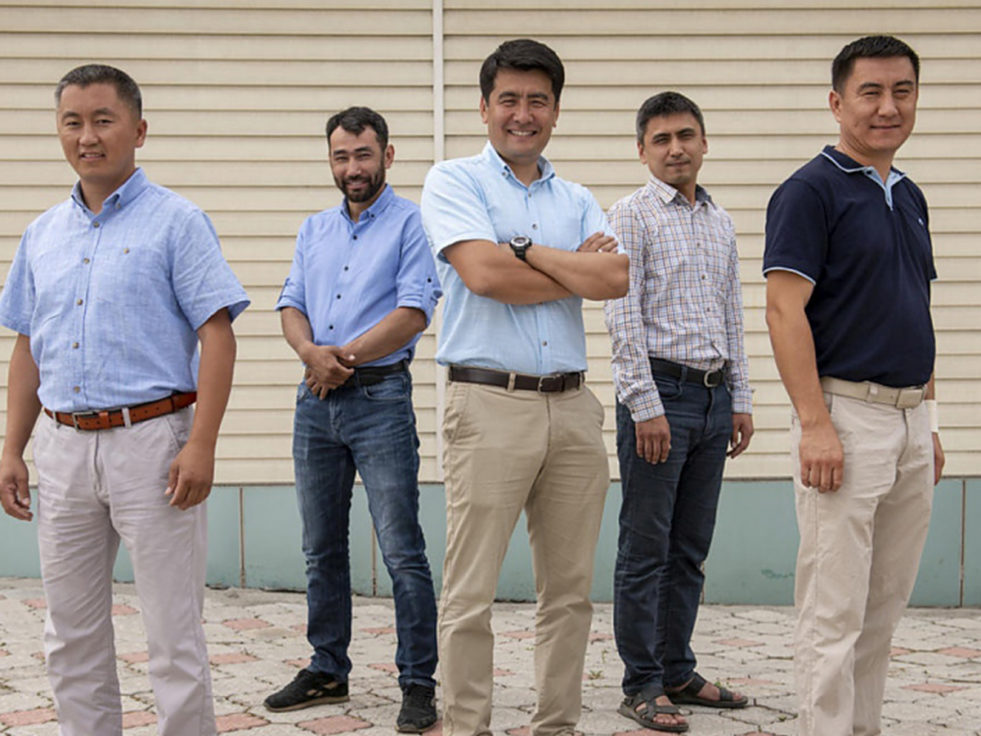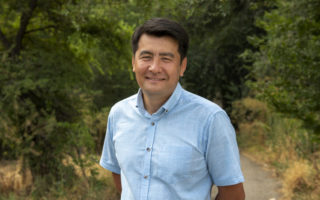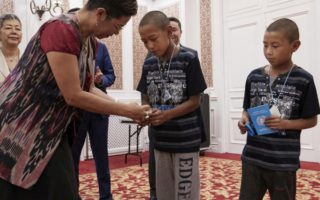
Azizbek Ashurov (center) with his team of lawyers at their offices in Osh, Kyrgyzstan. © UNHCR/Chris de Bode
Heading out on foot, on horseback and in four-wheel drives, Azizbek Ashurov and his team of lawyers have helped Kyrgyzstan to end statelessness.
Azizbek Ashurov says he does not secure citizenship for people who live without it. He says he simply returns what was theirs all along.
Softly spoken, with a warm smile, the lawyer has spent the last 15 years championing the rights of over 10,000 stateless people in Kyrgyzstan, leaving no stone unturned in his fight to ensure that they have citizenship.
Together with a team, he has scoured the country in a battered four-wheel-drive Lada. He has scaled treacherous mountains on horseback and trekked the streets of remote communities to find people living deep in the shadows without papers.
Now his tireless work has paid off, helping the Central Asian nation to achieve a historic first: ending statelessness within its borders. What’s more, Ashurov has been named the winner of the 2019 Nansen Refugee Award, a prestigious annual prize that honours those who have gone to extraordinary lengths to support refugees and displaced people.
“There is a saying – no thunder, no rainfall.”
“Everyone asked if we would be able to deliver,” says the 38-year-old. “They said it would be very difficult. When we started, these people were really invisible. The state did not know about them, there were no statistics.”
“But I was young and ambitious, and my team had a shared love for human rights. There is a saying – no thunder, no rainfall.”
Statelessness blights the lives of millions of people globally. It robs them of basic rights such as access to health care, education, jobs and free movement, or even the ability to open a bank account or buy a SIM card for a mobile phone.
The break-up of the Soviet Union in the 1990s left hundreds of thousands across Central Asia stateless, including in Kyrgyzstan. Others were left in limbo due to gaps in legislation or marriages between different nationalities.
Among those stranded without documents was mother-of-three Shirmonkhon Saydalieva, who became stateless after the borders of the former Soviet Union were redrawn to form independent Kyrgyzstan.
“Life was very difficult without papers,” says the 47-year-old. “We couldn’t work. We couldn’t visit relatives. We couldn’t do anything – we couldn’t even go to hospital. Nobody would help us.”
For decades, three generations of her family lived on the breadline.
“Then the lawyers came,” she recalls, smiling.
Ferghana Valley Lawyers Without Borders, headed by Ashurov, was first established in 2003 to offer free legal advice. Nationality issues were a major part of their caseload and they began focusing on statelessness in 2007. In 2014, funding from UNHCR, the UN Refugee Agency, helped to set up mobile legal clinics and map the problem.
The team found that Kyrgyzstan’s corner of the Ferghana Valley, a densely populated region of Central Asia that also encompasses parts of Uzbekistan and Tajikistan, was a hotspot, with over 10,000 people undocumented.
Thirty lawyers worked tirelessly, juggling up to 10 cases per day. Office hours became all hours. “We never had time to even think about what motivates us,” recalls Ashurov, who seldom made it home in time to put his children to bed. “Once one case was finished, we started the next.”
Behind them in their fight were some vital allies, who lobbied for change and improved legislation.
“Our main method was to work with the government,” says Ashurov. “We managed to get their attention and make them our friends. We were little warriors – but behind us was a big tank.”
“Once one case was finished, we started the next.”
In such a mountainous country, mobile teams were crucial. They criss-crossed Kyrgyzstan to reach some of its most remote communities, running legal clinics and door-to-door visits. Where the Lada could not go – rugged hillsides or steep valleys – the lawyers took to horses.
Ashurov says it took a long time to gain the trust of people who felt forgotten. But the challenges only strengthened his determination to help them.
“After all, how can you be guilty just because you were not born to the right people or because you were in the wrong place at the wrong time?”
This year in July the last people without documents in Kyrgyzstan finally received citizenship – thanks in great part to Ashurov and his team.
Despite the huge impact he has made, this remarkable man can easily go unnoticed. At a ceremony in Kyrgyzstan’s capital to celebrate the country’s achievement, he sported a simple black suit. He did not take a seat. Instead, he stood at the back, quietly watching, sharing credit for this world first with his colleagues.
“This is all very much team work,” he insisted, smiling.
Ashurov has worked around the clock for five years. He allows himself little time off. He stops only on Sundays to take his children to the fairground or tend to the flower beds in his garden. He says he is still looking for the right words to thank his wife.
All of the lawyers have hobbies. Ashurov says it helps them to manage the stress. Kanat, 37, is a movie stuntman. Nurlan, 40, keeps sheep. A running joke is that Almaz, 38, has doubled his workload by becoming the superintendent of his apartment block. But even Superman needs a break.
“I’ve had times when I thought I can’t go on,” says Ashurov. “The last time was a month ago. I got sick. There were problems at home and a lot of work at the office. I remember because it was raining. I’m only human.”
“This is all very much team work.”
His five remaining colleagues, including accountant Mayram, have kept him strong.
“I’ve spent nearly 16 years with these men,” he says. “We are not only colleagues or friends. We are brothers.”
“What I like most about Azizbek is that he doesn’t behave like a boss,” says Kanat, who has been working with Ashurov’s team since 2013. “He behaves like a leader. He will always be at the forefront with you.”
When they are not tackling statelessness, the lawyers have another challenge – to win the local league of ‘Что? Где? Когда?’ (‘What? Where? When?’), a team trivia game popular across the former Soviet Union.
So far, however, victory has been elusive.
“We were invited on the local television version recently. We said we don’t have the time, but the real reason is that we’ll lose.” Ashurov laughs, with a twinkle in his eye. “We’ll keep going. I am the type of person that if I am asked a question, I cannot rest until I know the answer.”
“We are not only colleagues or friends. We are brothers.”
As the midpoint of UNHCR’s #IBelong Campaign, UNHCR has called on states to commit to taking ambitious and rapid action in order to meet the Campaign’s goal of ending statelessness by 2024.
“Kyrgyzstan’s leadership on resolving known cases of statelessness is a remarkable example that I hope others will applaud and heed,” says Filippo Grandi, the UN High Commissioner for Refugees.
Yasuko Oda, UNHCR’s Regional Representative for Central Asia, hopes Kyrgyzstan’s achievement will inspire other countries in the world to do the same. “Ending statelessness can be achieved with truly collective understanding and efforts of all, including former stateless people themselves as role models and advocates, as well as those still without papers and the courage to come forward to be identified,” she says.
Ashurov and his team are now working to help other Central Asian countries to reduce statelessness. They have helped to set up a network to share information and bring civil society and governments together.
“We are a small country, with few resources,” Ashurov says. “But we have resolved statelessness together. It is not impossible, and it can be applicable elsewhere. Citizenship is not a privilege, it is a necessity. These are not just numbers – these are people whose lives have been changed forever.”
Originally published on UNHCR on 2 October 2019





